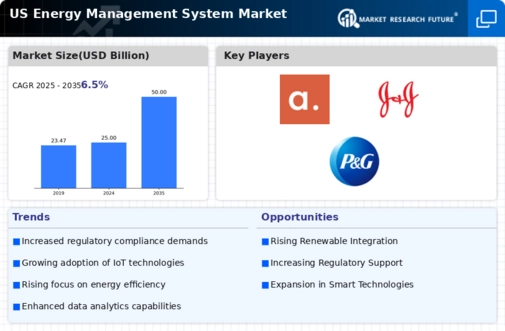Rising Energy Costs
The energy management-system market is experiencing a notable surge due to the rising costs of energy in the United States. As energy prices continue to escalate, businesses and consumers are increasingly seeking solutions to optimize their energy consumption. This trend is particularly evident in commercial sectors, where energy expenditures can account for a significant portion of operational costs. According to recent data, energy costs have risen by approximately 15% over the past five years, prompting organizations to invest in energy management systems to enhance efficiency and reduce waste. The energy management-system market is thus positioned to benefit from this economic pressure, as stakeholders look for innovative ways to manage their energy resources more effectively.
Government Incentives and Support
Government incentives and support are significantly influencing the energy management-system market. Various federal and state programs are designed to promote energy efficiency and renewable energy adoption, providing financial assistance to organizations that implement energy management systems. These incentives can take the form of tax credits, grants, or rebates, making it more financially viable for businesses to invest in energy management solutions. Recent data indicates that over 50% of organizations have benefited from such programs, which not only reduce upfront costs but also encourage long-term energy savings. As government support continues to evolve, it is likely to further stimulate the energy management-system market.
Increased Focus on Sustainability Initiatives
The energy management-system market is witnessing a growing emphasis on sustainability initiatives across various sectors. Organizations are increasingly recognizing the importance of reducing their carbon footprint and adhering to environmental regulations. This shift is prompting investments in energy management systems that facilitate the tracking and reporting of energy consumption and emissions. According to recent statistics, approximately 70% of companies in the United States have set sustainability goals, which often include energy efficiency targets. As businesses strive to meet these objectives, the demand for energy management systems is expected to rise, positioning the market for substantial growth in the coming years.
Technological Advancements in Energy Solutions
Technological advancements are playing a crucial role in shaping the energy management-system market. Innovations in software and hardware, such as smart meters and advanced analytics tools, are enabling more precise monitoring and control of energy usage. These technologies facilitate real-time data collection and analysis, allowing organizations to make informed decisions regarding their energy consumption. The integration of artificial intelligence and machine learning into energy management systems is also enhancing predictive capabilities, which can lead to further energy savings. As these technologies continue to evolve, they are likely to drive the growth of the energy management-system market, providing users with sophisticated tools to optimize their energy strategies.
Growing Awareness of Energy Efficiency Benefits
The energy management-system market is experiencing growth driven by an increasing awareness of the benefits associated with energy efficiency. As more organizations recognize the potential for cost savings and improved operational performance, the adoption of energy management systems is on the rise. Studies suggest that implementing these systems can lead to energy savings of up to 30%, making them an attractive option for businesses looking to enhance their bottom line. This heightened awareness is particularly prevalent in sectors such as manufacturing and commercial real estate, where energy costs are a significant concern. Consequently, the energy management-system market is likely to expand as more entities seek to capitalize on these efficiency benefits.















